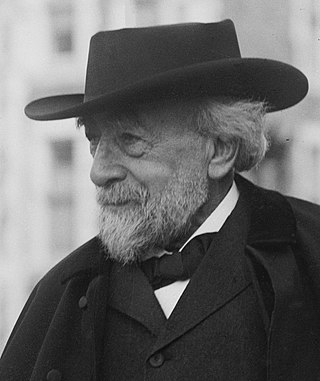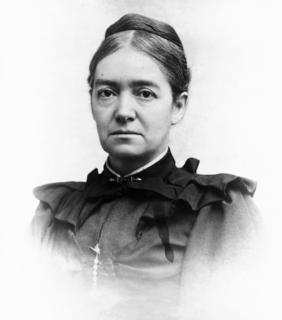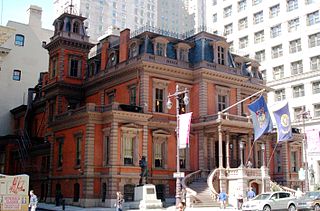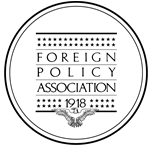Related Research Articles

London County Council (LCC) was the principal local government body for the County of London throughout its existence from 1889 to 1965, and the first London-wide general municipal authority to be directly elected. It covered the area today known as Inner London and was replaced by the Greater London Council. The LCC was the largest, most significant and most ambitious English municipal authority of its day.

The League of Women Voters (LWV) is a nonprofit, nonpartisan political organization in the United States. Founded in 1920, its ongoing major activities include registering voters, providing voter information, and advocating for voting rights. In addition, the LWV works with partners that share its positions and supports a variety of progressive public policy positions, including campaign finance reform, health care reform, gun control and LGBT+ rights.

The National Constitution Center is a non-profit institution devoted to the Constitution of the United States. On Independence Mall in Philadelphia, Pennsylvania, the center is an interactive museum and a national town hall for constitutional dialogue, hosting government leaders, journalists, scholars, and celebrities for public discussions. The center offers civic learning resources onsite and online. It does not house the original Constitution, which is stored at the National Archives Building in Washington, D.C.

Abraham Jacobi was a German physician and pioneer of pediatrics. He was a key figure in the movement to improve child healthcare and welfare in the United States and opened the first children's clinic in the country. To date, he is the only foreign-born president of the American Medical Association. He helped found the American Journal of Obstetrics. He is regarded as the Father of American Pediatrics.

Carrie Chapman Catt was an American women's suffrage leader who campaigned for the Nineteenth Amendment to the United States Constitution, which gave U.S. white women the right to vote in 1920. Catt served as president of the National American Woman Suffrage Association from 1900 to 1904 and 1915 to 1920. She founded the League of Women Voters in 1920 and the International Woman Suffrage Alliance in 1904, which was later named International Alliance of Women. She "led an army of voteless women in 1919 to pressure Congress to pass the constitutional amendment giving them the right to vote and convinced state legislatures to ratify it in 1920" and "was one of the best-known women in the United States in the first half of the twentieth century and was on all lists of famous American women."

Mary Corinna Putnam Jacobi was an esteemed American medical physician, teacher, scientist, writer, and suffragist. She was the first woman to study medicine at the University of Paris, and had a long career practicing medicine, teaching, writing, and advocating for women's rights, especially in medical education. Disparaging anecdotal evidence and traditional approaches, she demanded rigorous scientific research on every question of the day. Her scientific rebuttal of the popular idea that menstruation made women unsuited to education was influential in the fight for women's educational opportunities.

The Union Leagues were quasi-secretive men's clubs established separately, starting in 1862, and continuing throughout the Civil War (1861–1865). The oldest Union League of America council member, an organization originally called "The League of Union Men", was formed in June 1862 in Pekin, Illinois. Four months later, on November 22, 1862, the Union League of Philadelphia, the first of the elite eastern Leagues and the second oldest ULA council member, was established.

The Foreign Policy Association is a non-profit organization founded in 1918 dedicated to inspire the American public to learn more about the world. The Foreign Policy Association aims to spread global awareness and understanding of foreign policy issues. The organization's currentPresident & CEO is Noel V. Lateef who is also the longest serving President of the Foreign Policy Association.

The Town Hall is a performance space at 123 West 43rd Street, between Broadway and Sixth Avenue near Times Square, in the Theater District of Midtown Manhattan in New York City. It was built from 1919 to 1921 and designed by architects McKim, Mead & White for the League for Political Education. The auditorium has 1,500 seats across two levels and has historically been used for various events, such as speeches, musical recitals, concerts, and film screenings. Both the exterior and interior of the building are New York City landmarks, and the building is on the National Register of Historic Places as a National Historic Landmark.

The Calhoun School is a progressive, co-educational, independent school on New York City's Upper West Side, serving students from Pre-K through 12th grade. Founded in 1896, the school currently has approximately 600 students, housed in two separate buildings.
A forum was a public square in a Roman municipium, or any civitas, reserved primarily for the vending of goods; i.e., a marketplace, along with the buildings used for shops and the stoas used for open stalls. Many fora were constructed at remote locations along a road by the magistrate responsible for the road, in which case the forum was the only settlement at the site and had its own name, such as Forum Popili or Forum Livi.

The City College of the City University of New York is a public research university within the City University of New York (CUNY) system in New York City. Founded in 1847, City College was the first free public institution of higher education in the United States. It is the oldest of CUNY's 25 institutions of higher learning and is considered its flagship college.

America's Town Meeting of the Air was a public affairs discussion broadcast on radio from May 30, 1935, to July 1, 1956, mainly on the NBC Blue Network and its successor, ABC Radio. One of radio's first talk shows, it began as a six-week experiment, and NBC itself did not expect much from it.
The Ford Hall Forum is the oldest free public lecture series in the United States. Founded in 1908, it continues to host open lectures and discussions in the Greater Boston area. Some of the more well-known past speakers include Maya Angelou, Isaac Asimov, Noam Chomsky, Alan Dershowitz, W. E. B. Du Bois, Al Gore, Martin Luther King Jr., Henry Kissinger, Norman Mailer, Ayn Rand, Cokie Roberts, Eleanor Roosevelt, Robert Frost, Margaret Mead, Malcolm X, Jimmy Wales, and Gwen Ifill.
The Freedom Forum is a nonpartisan 501(c)(3) foundation dedicated to fostering First Amendment freedoms for all. The organization advances First Amendment freedoms through programs that include Today’s Front Pages, the Power Shift Project, the annual Al Neuharth Free Spirit and Journalism Conference for high school juniors, annual First Amendment Festival, Free Expression Awards and other conferences. Freedom Forum operated the Newseum in Washington, D.C. until 2019, when it sold the building to Johns Hopkins University.
Women's Medical Association of New York City is an organization of female physicians and medical students, with a mission to "provide communication, information, and educational programs for women in the medical profession, along with financial assistance to women medical students and researchers." It was charted by the state of New York in November 1909.
Public sphere pedagogy (PSP) represents an approach to educational engagement that connects classroom activities with real world civic engagement. The focus of PSP programs is to connect class assignments, content, and readings with contemporary public issues. Students are then asked to participate with members of the community in various forms of public sphere discourse and democratic participation such as town hall meetings and public debate events. Through these events, students are challenged to practice civic engagement and civil discourse.
George V. Denny Jr. (1899–1959) was the long-time moderator of one of radio's first talk shows, America's Town Meeting of the Air, as well as the executive director of the League for Political Education/Town Hall, which produced the program. Denny moderated America's Town Meeting of the Air from 1935 to 1952 and had a major role in choosing weekly topics.

Women Creating Change is a nonprofit organization founded in 1915 by suffragettes in New York City. WCC is still active in the New York community.
Eleanor "Ella" Butler Sanders was an American suffragist, and socialite. She founded the League for Political Education. Vassar College has a building named after her.
References
- 1 2 3 "SOCIETIES TO PUT UP A 12-STORY BUILDING: League for Political Education, Civic Forum, and Economic Club to Invest $1,200,000," New York Times (Feb. 26, 1914).
- ↑ "Greater City At Last Will Have "Town Meeting Place" For All Civic Discussions, Club For Men and Women" . Newspapers.com. The Brooklyn Daily Eagle. 28 December 1919. p. 17. Retrieved 2020-12-05.
- 1 2 The Biographical Cyclopaedia of American Women. Halvord publishing Company, Incorporated. 1924. p. 89.
- ↑ "The Public Forum". The American Review of Reviews. January–June 1920. p. 524.
- ↑ "Senator Helen Ring Robinson Calls Herself the Housewives' Representative in Colorado". New York Times . November 23, 1913. Retrieved 2008-12-10.
- 1 2 "George V. Denny, Radio Host, Dead." New York Times, November 12, 1959, p. 35.
- ↑ "Boston Symphony Returns to the Air; Town Meetings to Be Resumed as Public Forum." New York Times, November 1, 1936, Section X, p. 12.
- ↑ Listokin, David (2012). Landmarks Preservation & the Property Tax. Transaction Publishers. p. 88. ISBN 9781412850605 . Retrieved November 12, 2014.